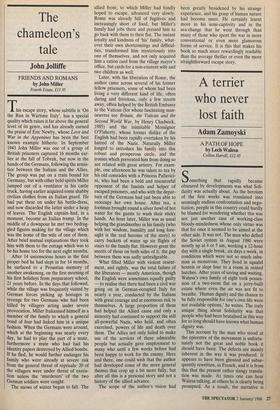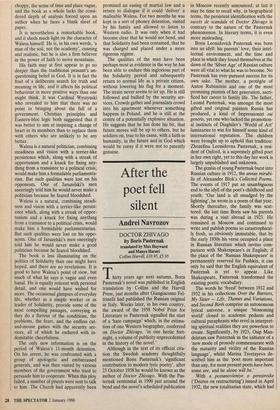A terrier who never lost faith
Adam Zamoyski
A PATH OF HOPE by Lech Walesa Collins Harvill, £12.95 Something that rapidly became obscured by developments was what Soli- darity was actually about. As the heroism of the first weeks was translated into seemingly endless confrontation and nego- tiation, people in this country could hardly be blamed for wondering whether this was not just another case of working-class bloody-mindedness whose only virtue was that for once it seemed to be aimed at the other side. It was not. The men who defied the Soviet system in August 1980 were mostly up at 4 or 5 am, working a 12-hour day with a single break, six days a week, in conditions which were not so much inhu- man as monstrous. They lived in squalid hostels or slept four to a room in rented hutches. After years of saving and waiting, Walesa's own family of eight took posses- sion of a two-room flat on a jerry-built estate where even the air was not fit to breathe. 'Human dignity and the chance to be fully responsible for one's own life were not available options,' he writes. The truly unique thing about Solidarity was that people who had been brutalised in this way for so long should have known what human dignity was.
This account by the man who stood at the epicentre of the movement is unfortu- nately not the great and noble book it should have been. The defects are mainly inherent in the way it was produced. It appears to have been ghosted and subse- quently rewritten, in French, and it is from this that the present rather slangy transla- tion was made. At times one can hear Walesa talking, at others he is clearly being prompted. As a result, the narrative is choppy, the sense of time and place vague, and the book as a whole lacks the consi- dered depth of analysis forced upon an author when he faces a blank sheet of paper.
It is nevertheless a remarkable book, and it sheds much light on the character of Walesa himself. He is, in his own words, 'a man of the soil, not the academy', cunning and realistic, but he is also a firm believer in the power of faith to move mountains.
His faith may at first appear to go no deeper than the traditional peasant's un- questioning belief in God. It is in fact the fruit of a deliberate search for truth and meaning in life, and it affects his political behaviour in more positive ways than one might think. It was Cardinal Wyszynski who revealed to him that there was no point in bringing about the fall of a government. Christian principles and Eastern-bloc logic both suggested that it was better to aim at inspiring a change of heart in its members than to replace them with others who are unlikely to be any better.
Walesa is a natural politician, combining steadiness and vision with a terrier-like persistence which, along with a streak of opportunism and a knack for fixing any- thing from a transistor to a political crisis, would make him a formidable parliamenta- rian. But such qualities were lost on his opponents. One of Jaruzelski's men sneeringly told him he would never make a politician because he feared bloodshed.
Walesa is a natural, combining steadi- ness and vision with a terrier-like persist- ence which, along with a streak of oppor- tunism and a knack for fixing anything from a transistor to a political crisis, would make him a formidable parliamentarian. But such qualities were lost on his oppo- nents. One of Jaruzelski's men sneeringly told him he would never make a good politician because he feared bloodshed.
The book is less illuminating on the politics of Solidarity than one might have hoped, and there are no revelations. It is good to have Walesa's point of view, but much of what he says is vague and even banal. He is equally reticent with personal detail, and one would have wished for more. The occasional glimpses of everyday life, whether as a simple worker or as leader of Solidarity, provide some of the most compelling passages, conveying as they do a flavour of the conditions, the problems, the fears, and the endless cat- and-mouse games with the security ser- vices, all of which he endured with in- domitable cheerfulness.
The only new information is on the period of Walesa's 11-month detention. On his arrest, he was confronted with a group of apologetic and embarrassed generals, and was then visited by various members of the government who tried to persuade him to cooperate. When this ploy failed, a number of priests were sent to talk to him. The Church had apparently been promised an easing of martial law and a return to dialogue if it could 'deliver' a malleable Walesa. For two months he was kept in a sort of phoney detention, visited by his family and allowed to listen to Western radio. It was only when it had become clear that he would not bend, and that Solidarity had been contained, that he was charged and placed under a more rigorous regime.
The qualities of the man have been perhaps most in evidence in the way he has been able to endure this inglorious part of the Solidarity period and subsequently return to normal life as a private citizen, without lowering his flag for a moment. The strain never seems to let up. He is still followed and bullied by the security ser- vices. Crowds gather and journalists crowd into his apartment whenever something happens in Poland, and he is still at the centre of a potentially explosive situation. He suggests that he has done his bit, that future moves will be up to others, but he soldiers on, true to his cause, with a faith in humanity, in the future and in God which would be corny if it were not so patently genuine.











































 Previous page
Previous page